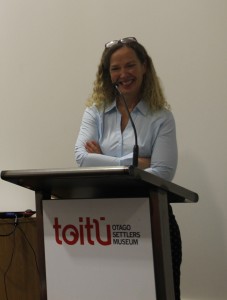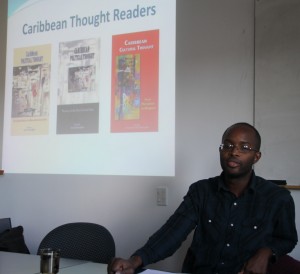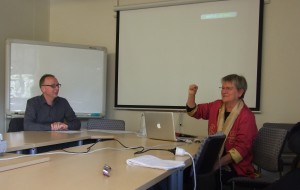Dunedin’s Genetic Inheritance and Caribbean Cultural Thought.
The Centre has recently hosted two riveting research-based talks.
The first, on Sunday 10 May, was part of the Centre’s ongoing project, Global Dunedin. Professor Lisa Matisoo-Smith, a biological anthropologist from Genetics Otago gave a public lecture at Toitū: Otago Settlers Museum, “Who do you think you are – Dunedin?”
Lisa discussed the genetic ancestry of Dunedin’s population based on the testing of randomly selected DNA samples. This research is part of the “Africa to Aotearoa” project, in which Lisa looks at the deep ancestry of New Zealanders, which in turn is part of a wider international study, the Genographic project, funded in part by National Geographic. While one might suspect that Dunedin’s genetic make-up is essentially homogenous from its Scottish heritage, the research shows just how diverse Dunedin’s population is, in line with other major cities in New Zealand.
On Thursday, May 15 visiting scholar Dr Aaron Kamugisha gave a CRoCC seminar, “The Caribbean’s Intellectual History through Culture”. Aaron discussed the global impact of Caribbean theorist’s, particularly CLR James, amongst others, on the development and dissemination of anti-colonial thought and intellectual traditions. He placed these theorists in the context of the development of two threads of intellectual history: Caribbean Studies and Caribbean Cultural Studies, but argued that these thinkers ought to be understood in term of Caribbean radical thought.
Caribbean Intellectual History
On Thursday 14 May the Centre for Research on Colonial Culture is running a research seminar. The speaker is Dr Aaron Kamugisha who teaches cultural studies, the history of political thought & intellectual history at the University of the West Indies, Cave Hill. His recent publications include Caribbean Political Thought: The Colonial State to Caribbean Internationalisms (Kingston: Ian Randle, 2013), an edited collection Caribbean Political Thought: Theories of the Post-Colonial State (Kingston: Ian Randle, 2013); and another collection co-edited with Yanique Hume, Caribbean Cultural Thought: From Plantation to Diaspora (Kingston: Ian Randle, 2013).
Dr. Kamugisha’s talk is titled “The Caribbean’s Intellectual History Through Culture” and will be held at 1pm in 2N8 in the History Department’s Seminar Room.
All are welcome.
Visiting Fellow
The Centre for Research on Colonial Culture is very pleased to be hosting Dr. Patricia O’Brien, an ARC Future Fellow based at the Australian National University. In 2012 she was the JD Stout Fellow in New Zealand Studies at Victoria University of Wellington, and in 2011 she was the Jay I. Kislak Fellow in American Studies at the John W. Kluge Centre at the Library of Congress, Washington, DC. From 2001-2013 she was visiting Associate Professor in the Centre for Australian, New Zealand and Pacific Studies at Georgetown University, Washington, DC. She is the author of The Pacific Muse: Exotic Femininity and the Colonial Pacific (Seattle, 2006) and is currently working on a biography of Samoan nationalist leader Ta’isi O. F. Nelson.
Dr. O’Brien is visiting the Centre until March 24th and while in Dunedin will be giving two research talks. Her first talk is on Wednesday March 18th in the Department of History and Art History (Burns 5, from 3.30) on ‘Ta’isi O. F. Nelson and the Mau: Australian Dimensions to New Zealand and Samoan History’. On March 23rd she will present a paper to Te Tumu: School of Maori, Pacific and Indigenous Studies called ‘The Trials of Mr Nelson: Ta’isi O. F. Nelson and Indigenous Resistance in Interwar Samoa’. This talk will take in Cen3 (Central Library) from 2.30.
We hope to see you at both talks!
Forthcoming Talks
The Centre is hosting an informal research seminar on ‘Revolutions and Empires in the South-West Indian Ocean, 1788-1810’ by Dr Sujit Sivasundaram (University of Cambridge), on Thursday 6 November, at 2pm, 2N8 (History Department Seminar Room) in the Arts Building.
CROCC is also sponsoring a public lecture by Professor A.G. Hopkins, (University of Cambridge) entitled, ‘Is Globalisation Yesterday’s News?’. This will be held on Monday, 10 November 2014 at 5:15pm in the Moot Court, Level 10, Richardson Building. Professor Hopkins is one of the leading economic historians of his generation and he has produced authoritative works on West African economic history (An Economic History of West Africa (1973)), the economics of British imperialism (the landmark two-volume British Imperialism co-authored with Peter Cain) and was one of the first historians to grapple with the analytical possibilities of globalisation (editing both Globalization in World History (2002) and Global History: Interactions between the Universal and the Local (2006)). Professor Hopkins has provided the following abstract, which suggests it should be an engaging lecture:
Globalization envelopes the world – and historians too. The ‘g’ word is now mandatory in titles of books and articles; Ph.D. students follow their leaders in dedicating their dissertations to the subject. Yet, not so long ago postmodern approaches to the past were equally compelling: if you could not tell your trope from your alterity and your Spivak from your Bhaba, your chances of landing a job were minimal. Wise investors buy at the bottom of the market and get out at the top. So, it is worth asking whether shares in globalization have further to run or whether full value is already in the market. One way of answering this question is by considering the reasons why historiographical phases, like empires, rise, flourish, and decline. This approach provides pointers to the current state of globalization studies and offers an estimate of the current value of the shares. The advice comes with a wealth warning: past performance has limited predictive power. As a famous trumpeter remarked when asked which way jazz was going: ‘man, if I knew which way jazz was going, I would be there already!’
Moving Texts
Mark your diaries! Prof. Tony Ballantyne, Director of the Centre for Research on Culture, is giving a research talk titled “Moving Texts: Humanitarian Narratives and the British Empire in the 1820s and 1830s” as part of the Department of History and Art History’s Research Seminar Series. Tony’s talk will take place on March 26th in Burns 5 (Arts Building, University of Otago) and begins at 3.30.
Research Talk by Samia Khatun
Dr. Samia Khatun, who is a guest of the Centre for Research on Colonial Culture, will give a research presentation to the Department of History and Art History on Wednesday 18th September.
The title of her talk is ‘Placing Indian Ocean Travellers: Aboriginal Language Stories about South Asian Workers in the Australian Interior, 1860-1930’.
ABSTRACT: Late on a Tuesday afternoon in c.1895, two young Aboriginal sisters were waiting at Alberrie Creek railway siding in the South Australian desert, when two Muslim men on camels rode past on their way to the nearby dam. Upon sighting the waiting girls, the men brought their beasts to a sudden halt. To the dismay of the sisters, ‘the train was running late.’ The story of what happened that evening at Alberrie Creek railway siding remains in the oral records of Arabunna people today and is a tale of two intersecting geographies rarely examined together: An Indian Ocean world peopled by itinerant peddlers and princes and arid Australian deserts criss-crossed by paths of Aboriginal mobility. With close attention to Arabunna language tales of sexualised encounter between distinct subject peoples of the British Empire, I examine the space/place politics that belie Arabunna memories of Indian Ocean travellers in Australian deserts.
Samia’s talk will take place in Burns 5, Arts Building, University of Otago starting at 3.30.
See you there!
Paper Work
Professor Tony Ballantyne (Otago) and Associate Professor Craig Robertson (Northeastern University), who is spending his sabbatical in the Department of History and Art History, have organised two events that explore the history and meaning of paper work.
On Thursday evening 23 May (5.30 Burns 2) the distinguished media historian Professor Lisa Gitelman (NYU) will deliver a public lecture entitled the ‘The Social Life of Paper’.
On Friday 24 May there will be a one day research symposium at the Hocken Collections on ‘Paper Work: The Materials and Practices of Modern Information Cultures’. The programme is below. Please email Tony if you would like to attend: tony.ballantyne@otago.ac.nz
Paper Work: The Materials and Practices of Modern Information Cultures
9.20am: Welcome
9.30-11.45am
Barbara Brookes, Committed by Paper: Incoherence and Accountability in the Seacliff Asylum Files
Jane McCabe, The Kalimpong Files: Private and Confidential
1.30-3.00pm
Stephen Robertson (University of Sydney), Private Detectives and the Paper Work of Surveillance in the US, 1855-1939
Craig Robertson (Northeastern University), Handling Information: File Clerks, Efficiency, and the Emergence of the Modern Office
3.15-4.45pm
Tim Rowse (University of Western Sydney), Tabulating Indigenous Populations: Colonial Knowledge in Two Dimensions
Tony Ballantyne, Paper and the Work of Empire: Bureaucracy and British Colonialism
Research Seminar on Transnational Indigenous Women’s Activism
On March 1st the Centre for Research on Colonial Culture will co-host a research seminar by visiting scholar Professor Margaret D. Jacobs, University of Nebraska. Her seminar is entitled: “Transnational Indigenous Women’s Activism and the Indigenous Child Welfare Crisis, 1960-1980s.’
Gandhi and Slow Reading
The Centre was fortunate to have Isabel Hofmeyr (University of Witwatersrand) give a stimulating seminar on 3 December.
Professor Hofmeyr explored the presses of turn-of-the-century Natal, focusing specifically on Gandhi’s Indian Opinion, produced by the International Printing Company. Although this multi-lingual newspaper was originally based in Durban, Gandhi shifted it to his ashram at Phoenix in 1904, where its various inhabitants shared the production work. Professor Hofmeyr argues that Indian Opinion was printed not only inform and inspire people, but that its design was part of a larger vision to slow down the process of reading, that he saw increasingly tied to the pace of modern industrialized life. Gandhi’s experiences in newspaper publishing helped develop his later philosophy.
Professor Hofmeyr’s seminar is based on research that will be appearing in Gandhi’s Printing Press: Experiments in Slow Reading (Harvard University Press, forthcoming 2013). We urge you to buy it!
Vicente Diaz Seminar
The Department of History and Art History and the Centre for Research on Colonial Culture are delighted to be hosting a talk by renowned indigenous scholar, Vicente M. Diaz (American Indian Studies and Anthropology, University of Illinois at Urbana-Champaign). The talk will take place on Tuesday 11 December at 10.00-11.15 AM in the History & Art History seminar room, 2N8, Burns Building. His title is: ‘Voyaging Ancient Futures’
Abstract: This multimedia talk presents two decades of outrigger canoe voyaging in Micronesia, and in the US Heartland (Michigan and Illinois), to broach alternative ways of reimagining the links between history and future, and links between narratology and archives. This work ranges from building and sailing traditional voyaging canoes to more recent work in advanced visualization technology (3-D, Virtual, and Augmented Reality) enroute to producing virtual voyaging and simulating atolls and their cultural practices as a counter archive.




